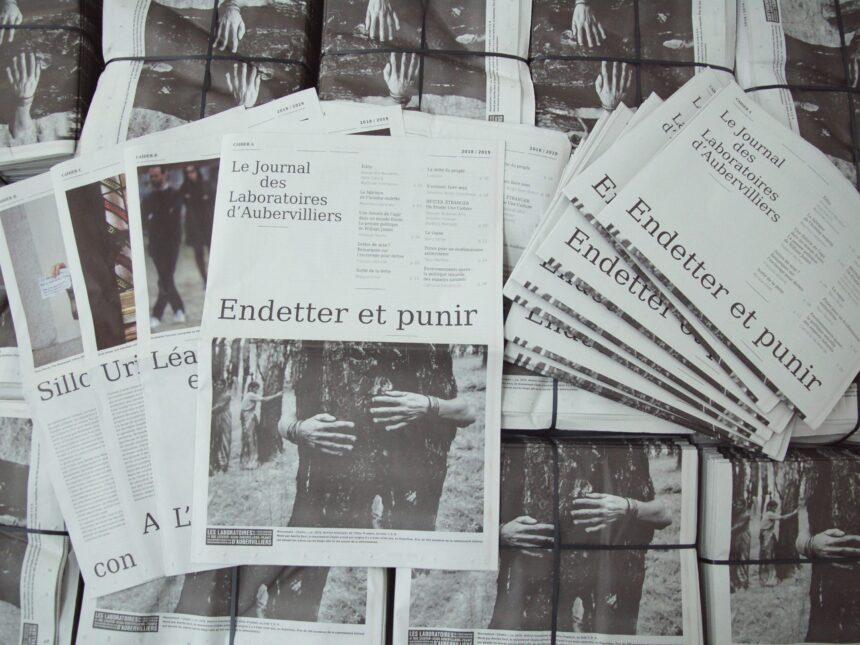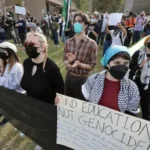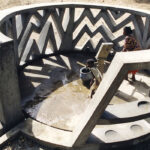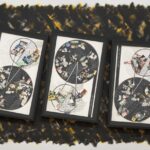Report on Paris – France
Vanessa Theodoropoulou
On May 7th 2017, France entered a new era in the history of her Ve République. Down with the good-old mainstream right-left dualism, in crisis here, as in most European countries, France has by default embraced the fiercely marching (En Marche !) macronian neo-liberalism. Young and smart, capable of quoting Hegel and Spinoza while calling on the people to “build a start-up nation,” the new President has managed to seduce the Parisian bourgeoisie as a part of the politically disenchanted middle-classes, who are now starting to realize the effects of his reforms. But things did not change all of a sudden.
During the last couple of years, a series of events emblematic of global-local neo-politics have occupied the public political and cultural debate in France. Amidst the refugee crisis, which has left thousands of Syrians and Africans looking for shelter in Europe, France witnessed the progressive destruction of the so-called Jungle de Calais (Jungle of the city of Calais). After illegally forming as an unplanned city in 2000, the Jungle de Calais became one of the most important refugee campsites in France up until its closure in October, 2016.
Away from Calais, in the Centre West, another operation of expulsion and destruction took place in April and May of 2018, this time pertaining to the settlements of the “zadistes,” an autonomous community formed by activists occupying and living in the ZAD [1] of Notre-Dame-des-Landes. The ZAD territory was initially destined to the construction of an airport, as part of a general plan to transform the region under a new economical platform. After years of negotiations with the concerned parties, and thanks to the mobilization and resistance efforts of the “zadistes” and people living in the region who opposed the plan, President Macron decided to withdraw the plan in January, 2018.

Finally, I should mention a series of social movements including: the continuous national strike of the railway men last spring, due to the ongoing reform of the SNCF (local railway public company), towards privatization, initiated by Macron; the mobilization against the government’s reform of the selection procedure permitting to access the higher education system, or “Law ORE” [2], enacted by the President in March 2018 as well as the rise of fees for non-European students; the angry and ofter violent Gilets jaunes protests (nov.-dec.2018) caused by the rising of fuel prices. Last but not least, last winter (2017-2018) was marked by the balance ton porc# (French version of Metoo#) avalanche, which included passionate debates, statements and petitions for or against a bill on sexual harassment in the street, the formation of new feminist collectives and manifestos, and emerging symposiums on important feminists such as Geneviève Fraisse or Nathalie Magnan.
Meanwhile, the Parisian artistic “milieu” went on divided into those who enjoy visiting art fairs and elegant champagne openings in private galleries and highly authored contemporary art venues (Fondation Louis Vuitton, Lafayette Anticipation ed.al.), and those who consider art as a social issue. This second half, composed by socially engaged artists and researchers is supported in France by small and often peripheral art centres and art schools, both public (in and around Paris: Les Laboratoires d’Aubervilliers, La Commune, La Galerie at Noisy-le-Sec, Espace Khiasma, CAC Bretigny ed.al) and private (Bétonsalon, Villa Vassilief, Kadist Art Foundation, La Colonie, Salle Principale, Fondation de France, SPEAP, The Cheapest University). Threatened by the reductions to public funding, inducing recourse to private sponsorships and marketing strategies, this still exceptionally wide and active territory has produced many socially engaged projects in the last few months, which take an interventionist approach to address all of the previously mentioned issues, ranging from migration crisis and debt, to climate change, (post)-colonialism or feminism.


Among them, I will focus firstly on the extraordinary research and fieldwork carried out by the collective, PEROU [3], which worked with refugees and the homeless population across different sites in France during the two years before the destruction of the Jungle de Calais, renamed by the collective as, “New Jungle,” or, “the city of hospitality.” The PEROU coordinator, Sébastien Thiéry, with the help of cartographers, historiographers, philosophers, artists, architects and city planners initiated a research project and organized a series of experiments aimed at helping the inhabitants to reinforce their wild but efficient existing structures, and institutions sustaining life in the territory (i.e. the church, club, library, school, hospital, supermarket, etc.). They co-produced new political apparatuses (the “Conseil des exilés”[4]) and representations, contrasting with the image of “human misery,” communicated by the media. In November 2017, PEROU was invited among other activist collectives (Arquitectura Expandida, Art Labor, Chto Delat, Iconoclasistas, Invisible Borders, Laagencia etc) to the new biennial platform created by the Centre Pompidou, called Cosmopolis, which aimed to highlight artistic practices from around the world, dealing with cosmopolitanism and questions such as cultural translation, identities, ecology, circulation etc.[5] On this occasion, Council, a program directed by French curators, Sandra Terdjman and Grégory Castéra, and methodologically affiliated to Bruno Latour’s SPEAP [6], presented one of their latest politically engaged “inquiries,” called, The Against Nature Journal, aimed at demonstrating how the concept of “nature” is still used in many countries in order to incriminate sexual orientations and regulate individual freedoms. Together with its sophisticated political inquiries, Council initiated a fellowship specifically for socially engaged projects, called Social Initiatives from Arts and Culture (AFIELD). AFIELD supports projects like Zeyno Pekünlü and Massimiliano Mollona’s Solidarity Academies, an activist platform run by Turkish academics forced out of the university. Solidarity Academies was formed to protect freedom of speech from both political pressures and the constraints of a neoliberal market, as well as to “relate knowledge production to the prioritization of peace, nonviolence and justice in the socio-political sphere.” [7]
Far off the centre of Paris, going North in the banlieu of Aubervilliers, another research-platform, built by the very active Laboratoires d’Aubervilliers [8], has been discussing issues such as art and labour, oppositional performance, the medical industry, the normalization of society, or the exploration of “extra sensory” perceptions and conceptions of the world. In the final event of the Printemps des Laboratoires, which took place in September 2018 (“Get them into debt and punish them”), a group of artists, historians, economists and activists, addressed the reality and ideology of debt, and the way debt policies impact not only the economy, but also our freedom, our daily behavior and personal relations.
I will end this brief (and definitely partial) report on the French, and mostly Parisian socially and politically engaged cultural production by returning to the city centre. These last two events are emblematic of a strong feeling that in order to resist and change things, we definitively need to go beyond individualism (in the arts as in all knowledge production fields) and towards collective and trans-disciplinary/epistemological platforms and collectives, and at the same time, symptomatic of an existing tendency in the Parisian “milieu” to fall back on description, speculation or simulation. The “Migrant Constituent Assembly” (28-29/1/2017, Centre Pompidou) curated by le people qui manque (a people is missing), took the form of a two day symposium, comprised of talks and presentations by artists, associations, activists and intellectuals (Etienne Balibar, Tania Bruguera, Yves Citton, Françoise Vergès ed.al), witnessing and denouncing the situation of the migrants and refugees. The supposed objective of this “assembly” was to collectively imagine and possibly write a “Migrant Constitution,” that would be “ordered by” the community of those who disappeared, the “missing people,” an assembly “in exile.”(9) Reflection, fiction and speculation were also the tools of a 36 hour marathon organized by the Daniel and Nina Carasso Foundation in partnership with the ENSAD (Ecole nationale supérieure des Arts Décoratifs) and the Cité international des arts, and curated by the director of Bétonsalon, Mélanie Bouteloup. We are not the number we think we are (2-3/2/2018), brought together many artists, researchers and thinkers from various geographical and disciplinary backgrounds, participating in lectures, exhibitions, small group workshops and meetings. Quoting Donna Haraway’s Cyborg Manifesto, searching for “a common language in which all resistance to instrumental control disappears and all heterogeneity can be submitted to disassembly, reassembly, investment and exchange,” the organizers of this ambitious event used Ursula K. Le Guin’s collection of short stories, The Compass Rose (1982) as a thematic pattern. Visitors met and exchanged within very specific work sessions around issues such as feminism and queerness, post-colonialism, the work of the activist journal The Bondy Blog, or the cultural cooperative Cuesta, ecology, epigenesist etc. Participants engaged through traditional modes (film making, conversation, texts), and more experimental methods, ranging from embroidery to making and sharing bread. Even if it turned up that we were rather less than we thought we would be, wandering up and down the long corridors of the Cité des Arts, in and out of very small rooms, those two exciting days were a great occasion to discover an incredible network of actors from various fields, producing non-spectacular, almost invisible in the mainstream art world, critical contents, objects and actions.
Vanessa Theodoropoulou is an art historian and art critic. She teaches Art History and Theory at the Ecole supérieure d’art et design TALM-Angers, where she coordinates the research platform “Ways of doing, modes of acting” including a seminar for the school’s Master of Fine arts. She obtained a PhD in Art History from University Paris 1 – Panthéon Sorbonne in 2008. She has been art and culture editor and correspondent for the greek newspaper “Kathimerini” (1998-2012). She has published various academic articles on the situationist movement, and collaborates regularly with art magazines contributing with critical writing related to her research issues. She has co-edited Au nom de l’art. Enquête sur le statut ambigu des appellations artistiques de 1945 à nos jours, Paris, Publications de la Sorbonne, 2013 and Le Chercheur et ses doubles, Paris, B42, 2015. Her current research project concerns theory and experimentation of artistic practices dealing with issues of « care » and attention.
https://esba.academia.edu/VanessaThéodoropoulou
https://manieresdefaire.wordpress.com
Notes
[1] ZAD for Zone d’Aménagement Différé (deferred development area), renamed by the « zadistes », Zone à Défendre (Area to be defended).
[2] ORE for Orientation et Réussite des Etudiants (Orientation and Succes of the Students)
[3] PEROU for Pole for the Exploration of the Urbain Ressources. Visit : perou-paris.org. The archive of the work done in Calais has been donated to the Frac Centre-Val de Loire.
[4] « The Council of the Exiled ».
[5] cosmopolis.centrepompidou.fr
[6] SPEAP, for Program of experimentation in arts and politics. One of the most ambitious projects of this program created by Bruno Latour on 2010 was the simulation by students from all over the world, of the COP21 (2015), in front of an audience and for 3 days.
[7] dayanismaakademileri.org
[8] Directed since 2012 and for a few more months by Mathilde Villeneuve, Alexandra Bautelot and Dora Garcia
[9] « A Migrant Constituent Assembly », in lepeuplequimanque.org







